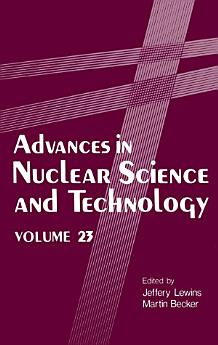Advances in Nuclear Science and Technology
Jeffery Lewins · Martin Becker
এপ্ৰিল ২০০৬ · Advances in Nuclear Science and Technology কিতাপ 23 · Springer Science & Business Media
ইবুক
194
পৃষ্ঠা
reportমূল্যাংকন আৰু পৰ্যালোচনা সত্যাপন কৰা হোৱা নাই অধিক জানক
এই ইবুকখনৰ বিষয়ে
The editors have pleasure in presenting this volume of our review series. We have specialised in three areas: perturbation Monte Carlo, non-linear kinetics and the transfer of radioactive fluids in rocks. These contributions are linked, however, in the demands for optimising complex systems that are a feature of the scale of nuclear power production. Kuniharu Kishida’s account of Japanese thinking in the application of modern non-linear theory to reactor kinetics and control comes at a time when the community of control scholars is seeking how to apply the new ideas that have led to the prominence of chaos theory to our field. Pr- lems of maintenance in power reactors are as severe as ever and must be solved for credibility to characterise any new program. As much as 30% of unanticipated down-time, for example, is due to the failure of motor op- ated valves. We need a theory to provide for preventive maintenance. This in turn depends heavily on on-line monitoring to anticipate failure as well as expert systems to schedule preventive treatment. Noise theory with its promise of on-line interpretation of information from inchoate breakdown is the key. It is all too likely that the need to deal with major departures makes a non-linear theory of noise essential. We can be grateful that P- fessor Kishida has provided us with such a consistent account.
এই ইবুকখনক মূল্যাংকন কৰক
আমাক আপোনাৰ মতামত জনাওক।
পঢ়াৰ নির্দেশাৱলী
স্মাৰ্টফ’ন আৰু টেবলেট
Android আৰু iPad/iPhoneৰ বাবে Google Play Books এপটো ইনষ্টল কৰক। ই স্বয়ংক্রিয়ভাৱে আপোনাৰ একাউণ্টৰ সৈতে ছিংক হয় আৰু আপুনি য'তে নাথাকক ত'তেই কোনো অডিঅ'বুক অনলাইন বা অফলাইনত শুনিবলৈ সুবিধা দিয়ে।
লেপটপ আৰু কম্পিউটাৰ
আপুনি কম্পিউটাৰৰ ৱেব ব্রাউজাৰ ব্যৱহাৰ কৰি Google Playত কিনা অডিঅ'বুকসমূহ শুনিব পাৰে।
ই-ৰীডাৰ আৰু অন্য ডিভাইচ
Kobo eReadersৰ দৰে ই-চিয়াঁহীৰ ডিভাইচসমূহত পঢ়িবলৈ, আপুনি এটা ফাইল ডাউনল’ড কৰি সেইটো আপোনাৰ ডিভাইচলৈ স্থানান্তৰণ কৰিব লাগিব। সমৰ্থিত ই-ৰিডাৰলৈ ফাইলটো কেনেকৈ স্থানান্তৰ কৰিব জানিবলৈ সহায় কেন্দ্ৰত থকা সবিশেষ নিৰ্দেশাৱলী চাওক।







